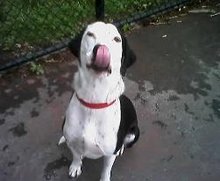Tuesday, April 10, 2007
Selecting a good food requires reading labels
I've heard a lot of frustration and remorse over the current Menu Foods recalls. Many ask, "How can I know if I am feeding my dog a safe product?" Quite simple, learn to read a label and learn a few simple facts about dog and cat food
The extrusion process
The majority of dry dog and cat food is made with an extruder. An extruder will gum up if the protein content of the food is more than 50%. Most commercial brands of dog food (Alpo, Pedigree, Purina) as well as those foods that claim to be premium (Nutro, Iams, Bil-Jac and Science Diet) have less than 30% protein. The rest of the food is comprised of filler. It is the type and quality of the protein and the filler that should be your primary concern.
Protein
Dog food ingredients are listed by weight. At least two meat sources should be among the top three ingredients in the food you serve to ensure your dog is getting enough protein. Whole fresh meat contains moisture and simply weighs more than grains and other fillers. If the first listed ingredient is a grain, run away...run far away.
The quality of that meat is important too. Look for fresh meat or meal and the type of meat or meal should be clearly identified For example a product listing chicken, lamb and herring meal would be superior to a similar product offering chicken, lamb and meat/animal meal.
Steer clear of meat by-products and animal proteins. The FDA does not have strict standards for these categories. Poor handling and slow transport can affect the quality of by-products. There is a much wider range in the quality of by-products than there is in fresh meat. Many commercial brands like to utilize these sources because they are cheaper sources of protein. Generic animal proteins or by-products enable them to utilize whatever is cheapest that day.
Fats to need to be specific as well. Chicken fat is vastly preferable to animal fat because it is clear what your getting. Animal fat again gives the manufacturer the ability to purchase cheap fats and mix them anyway they want. Some commercial pet foods have been known to purchase used restaurant grease and rendered fats.
Grains and Vegetables
Look for whole grains and vegetables. Avoid food fragments which are by-products of another food manufacturing process, such as brewers rice, wheat bran, rice bran, rice flour or wheat gluten. If you have a dog with food allergies, steer clear of foods that list wheat or corn in any form. It is important to mention that in both the Menu Foods recall and the Diamond Foods recall, grain quality was the problem. Brewing grains that get wet can ferment. Grains outsourced from other countries may be of substandard quality. Look for manufacturers who use grains that meet human consumption standards.
Preservatives, colors and sweeteners
Preservatives such as BHA, BHT, Ethoxyquin, propylene glycol, artificial colors and sweeteners such as corn syrup, sucrose and ammoniated glycyrrhizin should all be avoided.
Finally, any company that makes a food you intend to feed your pet should be completely upfront and honest about the quality of the ingredients, where and how the food is manufactured and what quality controls are in place. If they aren't, don't buy it
Labels:
Dog food,
Menu foods,
Nutrition
Subscribe to:
Post Comments (Atom)



1 comment:
By Products:
When I said steer clear, I was being to vague. When it comes to commercial as well as some "so called" premium foods, I stand firm on saying steer clear of these protein sources.
However, canids in the wild eat predominantly organ meat, a large part of what we consider to be by products.
Smaller companies, who take control of their supply sources and take great pride in the quality of their nutrition can be trusted. Abaday, for example, is a small New York based maufacturer of premium dog food. Everything is made in house and they stand behind the quality of their product. Abaday does include by products, but goes to great measures to insure the freshness of the by products they purchase.
As we go forward with grain contamination and lack of FDA testing of imports, it becomes more important to have conversations with your pet food manufacturer. Yes, you can do this! If they seem reticent or unwilling to divulge sources, don't buy their product.
One important note:
Most pet food companies, including high end foods like Innova, Solid Gold and Candidae, outsource their production to companies like Menu and Diamond. Look for companies that have employees at these manufacturing sites. These employees check cleanliness of the extruder between batches as well as do quality control of the ingredients purchased.
Post a Comment